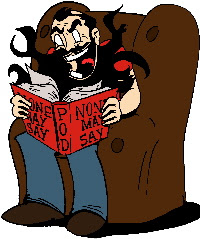 PLOT
PLOTDiana Luce loved plants. And they loved her.
Diana's husband, Bertram, didn't particularly love plants. Or her.
So Bertram murdered Diana.
And the plants are not pleased.
Not at all.
MY TAKE
There is not much plot to Vegetation. It is a tale of vengeance for murder, pure and simple. Except that the avenging party is not a bereaved family member, is not even human, but rather happens to be the collective flora of the world. Even so, it is apparent from the start exactly where Vegetation is headed.
So the pleasures of Vegetation do not lie in intricate plotting, although the plants devise many clever means of attack. Rather, the fun -- and there is much fun to be had -- comes from two sources. First, there is author Mark LaFlamme's dry, darkly humorous writing. LaFlamme's omniscient narrator is almost another character in the novel, stepping in to further belittle Bertram and almost giving a voice to the plants who, of course, are unable to actually speak for themselves. For example, when Bertram feels wronged by a bank teller early in the novel, he longs to drive away dramatically after verbally harassing her. But as the narrator makes clear, Bertram is not quite up to the task:
He was so angry, he even considered squealing his tires to add exclamation to his dissatisfaction. Sadly, he did not know how it was done.
And again, the narrator laughs with us (and with the plants) in setting the stage for another floral assault in Bertram's own bathroom:
Two things he learned very quickly: the rigid, pointed leaf of a Mother-in-Law's Tongue was as capable of piercing flesh as a combat knife. And a cactus does not belong in the bathroom.
Vegetation's other amusement, while perhaps more base, is no less genuine. For Vegetation is a novel for those of us who can admit that, on some level, we enjoy seeing evildoers suffer. Sure, some might argue that finding amusement in the torment of another, regardless of whether that person can be said to "deserve" his fate, only deadens the soul and begets more violence. And perhaps those people are right. But regardless of whether it is ennobling, the desire for vengeance is powerfully present in the human psyche. Watching it played out, even (or perhaps especially) in a fictional context (where no one is truly harmed), can be very cathartic. And seeing the pompous, amoral Bertram Luce increasingly harassed by the plants -- the novel makes clear that they are proponents of playing with their victims -- on the road to his ultimate punishment is, to be frank, emotionally satisfying.
But Vegetation actually is not quite so simplistic. LaFlamme goes out of his way to give us the background of Bertram's wretched childhood, so we can better understand the man (and the murderer) he grows up to be. As a result, we are not allowed the unfettered glee of uncomplicated justice. We know how Bertram came to be a monster, and so, even while applauding the plants' revenge, we also sympathize with the boy he used to be.
Yet LaFlamme's sympathy for Bertram, in turn, also is not quite so simplistic. LaFlamme comments on one occasion (after an incident during which Bertram has been brought especially low) that, if Bertram could only maintain the fleeting feelings of empathy and contrition he has been forced to experience, the plants might back off of their retribution. Bertram, however, is incapable of real change. So perhaps we are meant to understand that Bertram is beyond redemption after all, and that his punishment truly is deserved. I don't know if there is a right answer. But I credit Vegetation for being smart enough to raise the question, and nimble enough not to let it detract from the novel's overall fun.
AVAILABILITY
Vegetation is available in paperback for $15.95 from BookLocker, Barnes & Noble, or Amazon. LaFlamme also maintains a website that includes further information about Vegetation and LaFlamme's two other novels, several short stories for free download (and links to a couple more shorts available through Amazon), and lots of other additional content.
BONUS RECOMMENDATION
For more about the nature of vengeance, check out "Vengeance is Ours," a fascinating article recently printed in The New Yorker magazine. Or, for a more musical analysis, check out alternative industrial band Comrade Kommissar (on Four Control Records). For me, the highlight of From out of Nowhere (2004), Comrade Kommisar's only album to date, is "Revenge," on which the Comrade affects a laconic, lounge-esque baritone over a mid-tempo, dark alternative backing to extol the fine art of getting payback:
It has to be dangerous
It has to be refined
It has to be skillful
You need to take your time
Really, what more is there to say?

2 comments:
Hi, Mr. Kappa. Just caught your review of "Vegetation" and wanted to thank you for your study of it. Looks like you got beyond the comic book thrill of it and examined the intricacies of motivation and such. As an author, that kind of thing is always gratifying. And you're absolutely right about my struggles over feelings for much abused Bertram Luce. I tried to create a character so loathsome, it would be difficult for the reader to muster any sympathy for him. But as is often the case, he took on his own characteristics and history and dammit, there it was. Two thirds through the book, I began to develop a begrudging admiration for the dude. My favorite question to readers is always this: did you come to sympathize at all with Bert Luce? Or did you enjoy his suffering from end to end?
Again, I really appreciate your review. I'll bookmark your site and keep up with your others. You've got a sharp eye.
Thanks,
Mark LaFlamme
I am tempted by this one, but my TBR pile is already threatening to smother me to death....
Post a Comment